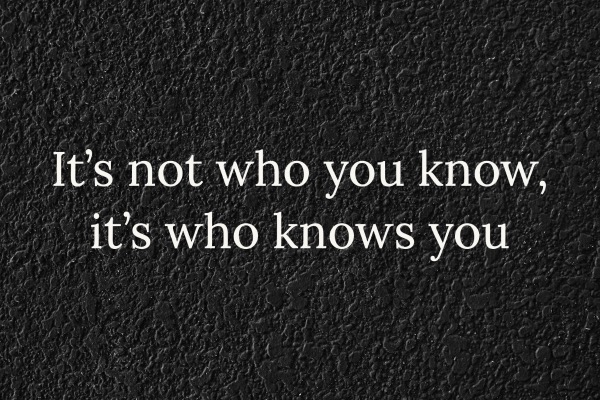“It’s not who you know, it’s who knows you” means who truly knows you as a person and/or a professional (coach). This is someone who remembers you and thinks something positive enough about you that influences them to respond favorably to a “call-to-action”. That call-to-action could be you asking a Director of Athletics that you used to work for to make a phone call to a colleague to recommend you for their available Head Coach position or a Head Coach that you have developed a relationship with making an introduction to another coach whose practice you would like to visit.
Once you make a new connection or leave for a new coaching position, it is critical that the relationship that will cause a person to respond positively to a call-to-action is one that is continued to be built and maintained, not just utilized when one side (you) needs something. This does not mean you need to call someone each week for them to be an asset when needed, but you do need to communicate enough with them when you do not need something to allow someone to be inspired to respond positively to your call-to-action when you do.
When I have a client who wants to pursue a Head Coach or an Assistant Coach position, I may ask them if they have a relationship with a specific Head Coach, Director of Athletics, or Senior Women’s Administrator from their current or a previous university who they can rely on for advice or to utilize to make a phone call to recommend them for their desired position. If the client says yes, I’ll then ask when was the last time they had talked with them? Think about it this way…
There is an available Head Coach position that you covet immensely because that position is at a University that is within the same conference where you used to be an Assistant Coach three years prior. You decide to reach out to the Director of Athletics and Senior Women’s Administrator at your former University to see if they would be willing to call the Director of Athletics and Senior Women’s Administrator at your desired University since they know them from being in the same conference. Before doing so, you need to process:
Did you make a positive impression while you were at your previous University?
Have you maintained follow-up with these administrators since you’ve been gone?
If you did not make a positive impression on them, you have zero chance of them responding positively to your call-to-action. If fact, you may hurt yourself rather than help yourself by using that person as a reference. If you made a positive impression, but lacked follow-up, there is a chance they may respond positively to your call-to-action. If you made a positive impression and maintained follow-up, they will not only most likely respond positively to your call-to-action, but be further motivated to speak confidently and very favorably about you, making a more significant impact with their recommendation.
When you network and are building a relationship, you will want to use the mentality that you are striving to create a positive impression and mindset about you through all of your direct and indirect interactions. A relationship, or even a positive impression and mindset, does not happen easily or in a brief period of time. Relationships, especially strong ones, take time and work to develop. If you’re willing to put the time and work in to develop them, it will prove extremely beneficial to you and your career in the long-term.

